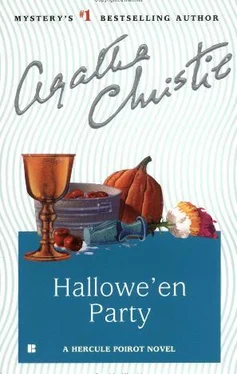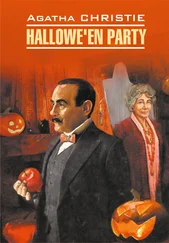Agatha Christie - Hallowe'en Party
Здесь есть возможность читать онлайн «Agatha Christie - Hallowe'en Party» весь текст электронной книги совершенно бесплатно (целиком полную версию без сокращений). В некоторых случаях можно слушать аудио, скачать через торрент в формате fb2 и присутствует краткое содержание. Год выпуска: 2004, ISBN: 2004, Издательство: Berkley, Жанр: Классический детектив, на английском языке. Описание произведения, (предисловие) а так же отзывы посетителей доступны на портале библиотеки ЛибКат.
- Название:Hallowe'en Party
- Автор:
- Издательство:Berkley
- Жанр:
- Год:2004
- ISBN:ISBN-13: 978-0425129630
- Рейтинг книги:3 / 5. Голосов: 1
-
Избранное:Добавить в избранное
- Отзывы:
-
Ваша оценка:
- 60
- 1
- 2
- 3
- 4
- 5
Hallowe'en Party: краткое содержание, описание и аннотация
Предлагаем к чтению аннотацию, описание, краткое содержание или предисловие (зависит от того, что написал сам автор книги «Hallowe'en Party»). Если вы не нашли необходимую информацию о книге — напишите в комментариях, мы постараемся отыскать её.
Hallowe'en Party — читать онлайн бесплатно полную книгу (весь текст) целиком
Ниже представлен текст книги, разбитый по страницам. Система сохранения места последней прочитанной страницы, позволяет с удобством читать онлайн бесплатно книгу «Hallowe'en Party», без необходимости каждый раз заново искать на чём Вы остановились. Поставьте закладку, и сможете в любой момент перейти на страницу, на которой закончили чтение.
Интервал:
Закладка:
"No," said Poirot, "thank you very much, but I think-I think I will go home." He could not face the prospect of black bitter tea. He thought of a good excuse that would mask any signs of bad manners.
"My feet," he explained. "My feet. I am not very suitably attired as to footwear for the country. A change of shoes would be desirable."
Elspeth McKay looked down at them.
"No," she said. "I can see they're not. Patent leather draws the feet. There's a letter for you, by the way.
Foreign stamps on it. Come from abroad-co Superintendent Spence, Pine Crest. I'll bring it to you."
She came back in a minute or two, and handed it to him.
"If you don't want the envelope, I'd like it for one of my nephews-he collects stamps."
"Of course." Poirot opened the letter and handed her the envelope. She thanked him and went back into the house.
Poirot unfolded the sheet and read.
Mr. Goby's foreign service was run with the same competence that he showed in his English one. He spared no expense and got his results quickly.
True, the results did not amount to much Poirot had not thought that they would.
Olga Seminoff had not returned to her home town. She had had no family still living. She had had a friend, an elderly woman, with whom she had corresponded intermittently, giving news of her life in England.
She had been on good terms with her employer who had been occasionally exacting, but has also been generous.
The last letters received from Olga had been dated about a year and a half ago. In them there had been mention of a young man. There were hints that they were considering marriage, but the young man, whose name she did not mention, had, she said, his way to make, so nothing could be settled as yet. In her last letter she spoke happily of their prospects being good.
When no more letters came, the elderly friend assumed that Olga had married her Englishman and changed her address.
Such things happened frequently when girls went to England. If they were happily married they often never wrote again.
She had not worried.
It fitted, Poirot thought. Lesley had spoken of marriage, but might not have meant it. Mrs. Llewellyn-Smythe had been spoken of as "generous". Lesley had been given money by someone, Olga perhaps (money originally given her by her employers), to induce him to do forgery on her behalf.
Elspeth McKay came out on the terrace again. Poirot consulted her as to her surmises about a partnership between Olga and Lesley.
She considered a moment. Then the oracle spoke.
"Kept very quiet about it, if so. Never any rumours about those two.
There usually is in a place like this if there's anything in it."
"Young Ferrier was tied up to a married woman. He might have warned the girl not to say anything about him to her employer."
"Likely enough. Mrs. Smythe would probably know that Lesley Ferrier was a bad character, and would warn the girl to have nothing to do with him."
Poirot folded up the letter and put it into his pocket.
"I wish you'd let me get you a pot of tea."
"No, no I must go back to my guest house and change my shoes. You do not know when your brother will be back?"
"I've no idea. They didn't say what they wanted him for."
Poirot walked along the road to his guest house. It was only a few hundred yards.
As he walked up to the front door it was opened and his landlady, a cheerful lady of thirty odd, came out to him.
"There's a lady here to see you," she said. "Been waiting some time. I told her I didn't know where you'd gone exactly or when you'd be back, but she said she'd wait." She added, "It's Mrs. Drake. She's in a state, I'd say. She's usually so calm about everything, but really I think she's had a shock of some kind.
She's in the sitting-room. Shall I bring you in some tea and something?"
"No," said Poirot, "I think it will be better not. I will hear first what she has to say."
He opened the door and went into the sitting-room. Rowena Drake had been standing by the window. It was not the window overlooking the front path so she had not seen his approach. She turned abruptly as she heard the sound of the door.
"Monsieur Poirot. At last. It seemed so long."
"I am sorry, Madame. I have been in the Quarry Wood and also talking to my friend, Mrs. Oliver. And then I have been talking to two boys.
To Nicholas and Desmond."
"Nicholas and Desmond? Yes, I know.
I wonder oh! one thinks all sorts of things."
"You are upset," said Poirot gently.
It was not a thing he thought he would ever see. Rowena Drake upset, no longer mistress of events, no longer arranging everything, and enforcing her decisions on others.
"You've heard, haven't you?" she asked. "Oh well, perhaps you haven't."
"What should I have heard?"
"Something dreadful. He's he's dead. Somebody killed him."
"Who is dead, Madame?"
"Then you haven't really heard. And he's only a child, too, and I thought oh, what a fool I've been. I should have told you. I should have told you when you asked me. It makes me feel terrible terribly guilty for thinking I knew best and thinking but I did mean if for the best, Monsieur Poirot, indeed I did."
"Sit down, Madame, sit down. Calm yourself and tell me. There is a child dead another child?"
"Her brother," said Mrs. Drake. "Leopold."
"Leopold Reynolds?"
"Yes. They found his body on one of the field paths. He must have been coming back from school and gone out of his way to play in the brook near there. Somebody held him down in the brook held his head under water."
"The same kind of thing as they did to the child Joyce?"
"Yes, yes. I can see it must be it must be madness of some kind. And one doesn't know who, that's what's so awful. One hasn't the least idea. And I thought I knew. I really thought I suppose, yes, it was a very wicked thing."
"You must tell me, Madame."
"Yes, I want to tell you. I came here to tell you. Because, you see, you came to me after you'd talked to Elizabeth Whittaker.
After she'd told you that something had startled me. That I'd seen something.
Something in the hall of the house, my house. I said that I hadn't seen anything and that nothing had startled me because, you see, I thought " she stopped.
"What did you see?"
"I ought to have told you then. I saw the door of the library open, open rather carefully and then he came out. At least, he didn't come right out. He just stood in the doorway and then pulled the door back quickly and went back inside."
"Who was this?"
"Leopold. Leopold, the child that's been killed now. And you see, I thought I oh, what a mistake, what an awful mistake. If I'd told you, perhaps perhaps you'd have got at what was behind it."
"You thought?" Poirot said. "You thought that Leopold had killed his sister. Is that what you thought?"
"Yes, that's what I thought. Not then, of course, because I didn't know she was dead. But he had a queer look on his face.
He's always been a queer child. In a way you're a little afraid of him because you feel he's not-not quite right. Very clever and a high IQ, but all the same not all there.
"And I thought 'Why is Leopold coming out of there instead of being at the Snapdragon?' and I thought 'What's he been doing-he looks so queer?' And then, well then I didn't think of it again after that, but I suppose, the way he looked upset me. And that's why I dropped the vase. Elizabeth helped me to pick up the glass pieces, and I went back to the Snapdragon and I didn't think of it again. Until we found Joyce. And that's when I thought-"
"You thought that Leopold had done it."
"Yes. Yes, I did think that. I thought it explained the way he'd looked. I thought I knew. I always think-I've thought too much all my life that I know things, that I'm right about things. And I can be very wrong. Because, you see, his being killed must mean something quite different. He must have gone in there, and he must have found her there dead and it gave him a terrible shock and he was frightened.
Читать дальшеИнтервал:
Закладка:
Похожие книги на «Hallowe'en Party»
Представляем Вашему вниманию похожие книги на «Hallowe'en Party» списком для выбора. Мы отобрали схожую по названию и смыслу литературу в надежде предоставить читателям больше вариантов отыскать новые, интересные, ещё непрочитанные произведения.
Обсуждение, отзывы о книге «Hallowe'en Party» и просто собственные мнения читателей. Оставьте ваши комментарии, напишите, что Вы думаете о произведении, его смысле или главных героях. Укажите что конкретно понравилось, а что нет, и почему Вы так считаете.












